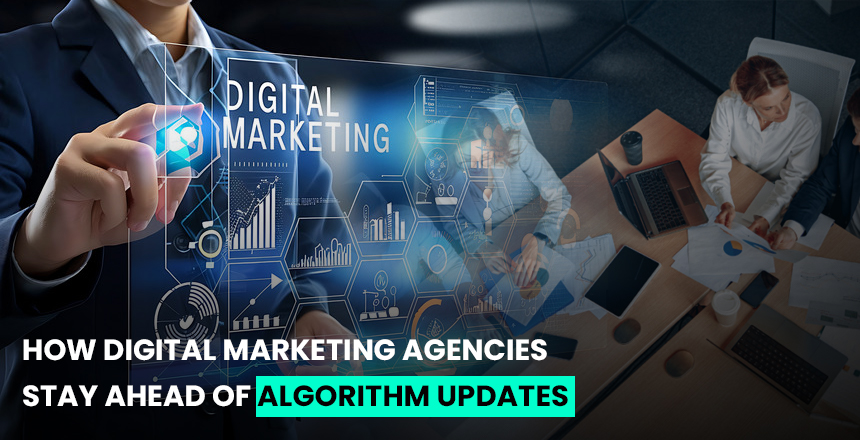Constantly keeping with changes in digital marketing and search engines. Digital marketing agencies are not immune to the latest challenges within the industry-imposed search engine algorithm changes. The algorithm continues to improve and change for optimal user experience. Digital marketing agencies are meant to work in agility, innovation, and proactiveness. In this blog, we will take a look at tools and strategies that allow a digital marketing agency to forecast and keep ahead of changes in the algorithms while still maintaining top performance for their clients.
Understanding Algorithm Updates
Search engine algorithms are complex systems designed to retrieve as much useful, high-quality information for users. Examples of major updates include Google’s Panda, Penguin, and more recent core updates; their aim is to penalize low-quality, poorly written content and, on the other side, to reward sites that really do give users value. Time and resources are exercised for digital marketing agencies in gaining in-depth knowledge about these updates by following industry news by established and credible sources like Search Engine Journal, Moz, and Google’s own announcements. The whole concept behind this anticipation and knowing is what helps agencies to know how an update might affect their clients’ websites to tailor or customize their strategies accordingly.
Attending Continuous Training and Learning
Continuous learning is one such strategy employed by agencies. It is a continuous process of keeping touch with updates of algorithms. As such, digital marketers have to be fed every now and then with the newest trends and best practices. Training and re-training of staff are organized very often for updating about SEO trends, algorithm updates, and data analytics. Therefore, their strategies can be quickly adapted whenever such updates launch since they are well-educated on the ongoing situations.
Agencies also participate in industry conferences and online forums. Networking with other professionals and sharing insights combined gives digital marketing experts a better lens through which to assess the impact of algorithm updates on the market. This synergistic nature often paves the way for early adoption of leading-edge tactics that keep client campaigns resilient amidst change.
Data-Driven Decision Making
Data analytics is essential in the response of agencies to the algorithm changes. Digital marketing agencies have also been investing in powder analytics tools to track metrics like organic traffic, bounce rates, and conversion rates. With the close monitoring of these indicators, any adverse effect caused by an update can be traced quickly. For instance, When Crypto Price Today: Bitcoin trades below $96200, is a clear case of market metric; the agencies will have similar real-time metrics with which to measure how an algorithm change affects an agency ranking. Using A/B testing, agency can test and see what is the best way to deal with things: a content refresh, technical adjustment, or whatever. Through these data-driven approaches, digital marketing teams can tweak their strategies and keep a website relevant.
Agile Strategy Adapter
The need for agility is undeniable in this Internet-dependent and digitally realistic world. Agile methodologies have been adopted by digital marketing agencies in the same line with software development: Now, they break down activities into bite-sized activities and continuously review their progress. So, when an algorithm update comes, digital agencies are able to make changes on the fly without messing up overall marketing objectives.
Agile strategies also allow agencies to decentralize change: waiting for a whole campaign to be redeveloped, teams can try testing small changes, keeping track of their performance. It is a much less risky proposition, which makes sure that a client site is always optimized for the search engines’ latest requirements.
Adopting Cutting Edge Technology
Investing in the newest gadgets equips forward-looking digital marketing agencies ahead of algorithm changes. Artificial intelligence (AI) and machine learning are going to become very important for predicting trends and analyzing large datasets. These technologies would allow them to forecast the impacts an algorithm update would have on the future.
They would use tools such as SEMrush, Ahrefs, and Google Analytics, which provide deep insight into keyword performance and competitor strategies. The agency could then quickly identify moving trend patterns of ranking and adjust its content and SEO strategies. This is critical to remaining highly visible on SERPs despite the increasing frequency of algorithm changes.
Building High-Quality Content
The backbone of any successful strategy for digital marketing resides in quality content. Algorithm updates invariably treat websites that post useful, researched, and user-friendly content with rewards. Digital marketing agencies usually handle the preparation of content which has relevant research and meets the following characteristics-the informative, engaging, and optimally useful to users and search engines.
(from) Content teams are also found closely working with SEO experts to incorporate targeted keywords naturally without being overrated on such added features. This kind of strategy affects the prompt recovery of websites from algorithm updates and positions them as authorities in their niches highest. High-quality content proves itself as a constant anchor for good search engine rankings in the rapidly changing digital arena.
Establishing Strong Technical Foundations.
Technical SEO is also an important area for any agency interested in keeping on top of algorithm updates. These agencies will undertake an intensive technical audit to determine and rectify any deficiencies that could inhibit search performance. The audit covers clean code, fast loading, mobile optimized, and secure connections (HTTPS) for the website. A good technical foundation will help websites perform even in algorithm updates designed to target technical deficiencies.
Maintaining sitemaps, correcting broken links, and improving site architecture are things that digital marketing agencies primed on. These sorts of technical optimizations would not only optimize user experience but would also lead to search engine crawlers being able to index and rank the content without much effort.
Collaboration and Transparency
Effective communication and collaboration of a digital marketing agency with his client are very important when algorithm changes arrive. Regular reports and updates are provided by the agencies on the effect of the new changes on performance with damage-control techniques being applied. Such transparency builds trust and lets clients see the result of continued optimization work.
Educating clients goes a long way, and by saying why traffic or rankings fluctuate, an agency manages expectations and builds a long-term relationship towards mutual growth and understanding.
Conclusion
The digital marketing business changes fast, so the capacity to adapt has become vital. Digital marketing agencies manage to survive changes in algorithms through continuous learning, data-driven decision making, agility in strategies, and investment in state-of-the-art technology. Agencies ensure their clients’ websites are valued for their high-quality content and sound technical basis, thus enabling them to stay one step ahead no matter how frequent changes in algorithms hit. This proactive and collaborative approach of agencies helps reduce the risk factor but, in return, tends to convert perceived issues into growth and innovation opportunities. The digital landscape keeps evolving, and so do the strategies mentioned above.








